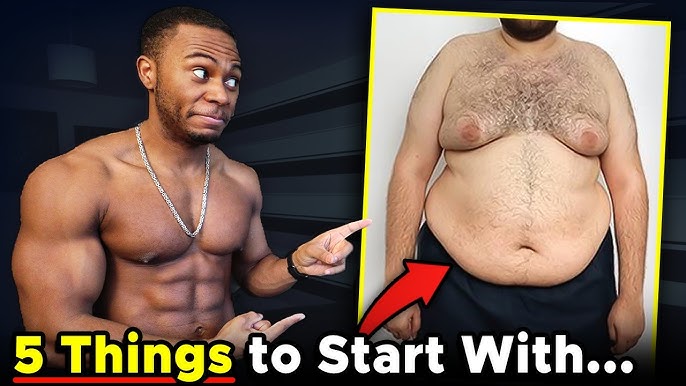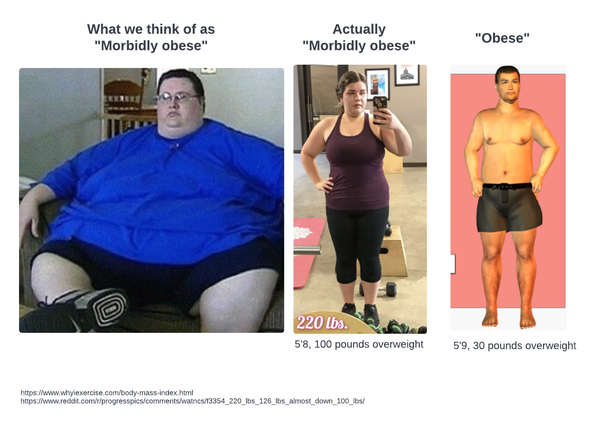Are you struggling to lose weight and don’t know where to start? If you’re obese, the idea of shedding pounds can feel overwhelming and even impossible.
But the truth is, small, simple changes can make a huge difference in your journey. Imagine feeling healthier, more energetic, and confident again. This article will guide you step-by-step on how you can begin losing weight safely and effectively. Keep reading—you’re closer to a new, healthier you than you think.

Set Realistic Goals
Losing weight is a challenge for obese people. Setting realistic goals helps make progress steady and safe.
Realistic goals keep motivation high and reduce the risk of giving up early.
Assess Current Health Status
Before starting to lose weight, know your current health. This includes weight, blood pressure, and other health factors.
Check with a doctor to understand your body’s needs and limits.
- Record your weight and body measurements
- Measure blood pressure and blood sugar levels
- Discuss any health problems with a doctor
- Understand your physical activity ability
Define Achievable Milestones
Break your weight loss goal into small, easy steps. Achievable milestones help you stay on track.
Set goals that fit your lifestyle and health status. Celebrate each milestone to keep going.
- Start with losing 5% of your body weight
- Plan weekly exercise goals, like walking 30 minutes
- Reduce sugary foods gradually
- Track your progress every week
Adopt Balanced Nutrition
Starting to lose weight can be hard for obese people. Eating balanced nutrition helps the body stay healthy while losing weight.
Balanced nutrition means eating the right kinds of foods in the right amounts. This supports steady weight loss and better energy.
Focus On Whole Foods
Whole foods are natural and less processed. They keep your body full and give important nutrients.
Try to eat more fruits, vegetables, whole grains, nuts, and lean proteins. These foods help reduce hunger and improve health.
- Fresh fruits like apples and berries
- Vegetables such as spinach and carrots
- Whole grains like brown rice and oats
- Lean proteins like chicken and fish
- Nuts and seeds in small amounts
Control Portion Sizes
Eating too much, even healthy food, can cause weight gain. Controlling portion sizes helps reduce calorie intake.
Use smaller plates and bowls to help control portions. Eat slowly and stop when you feel full.
- Measure food to know serving size
- Avoid second helpings
- Listen to your hunger and fullness signals
- Limit eating while watching TV or distracted
Limit Processed Sugars And Fats
Processed sugars and unhealthy fats add extra calories and can harm your health. Cutting these helps weight loss.
Choose natural sweeteners and healthy fats like olive oil instead. Read labels to avoid added sugars and bad fats.
- Skip sugary drinks and snacks
- Avoid fried and fast foods
- Use healthy oils like olive or avocado
- Check food labels for hidden sugars
Incorporate Physical Activity
Physical activity is important for losing weight safely. It helps burn calories and improves health.
Starting with the right exercises can make the process easier and more enjoyable.
Start With Low-impact Exercises
Low-impact exercises reduce stress on joints. They are safer for people with more weight.
Walking, swimming, and cycling are good examples of low-impact activities.
- Walking at a slow pace
- Swimming laps or water aerobics
- Using a stationary bike
- Chair exercises for beginners
Gradually Increase Intensity
Start with small amounts of exercise. Add time and effort as your body adjusts.
Increasing intensity slowly helps avoid injuries and keeps motivation high.
- Begin with 5 to 10 minutes daily
- Add a few minutes each week
- Increase walking speed or distance
- Try gentle hills or light weights
Find Activities You Enjoy
Choose exercises that feel fun and comfortable. Enjoyment helps you keep moving.
You can try dancing, gardening, or group classes to stay active and happy.
- Dance to your favorite songs
- Join a beginner exercise class
- Take walks in a park or nature
- Try gardening or light yard work
Build Healthy Habits
Losing weight can be easier by creating healthy habits. Small changes in daily life help keep weight off.
Healthy habits support your body and mind. They make weight loss steady and safe.
Establish Consistent Meal Times
Eating meals at the same time each day helps control hunger. This stops overeating and unhealthy snacking.
Try to eat balanced meals with vegetables, proteins, and whole grains. Avoid skipping meals to keep energy stable.
- Set regular times for breakfast, lunch, and dinner
- Avoid eating late at night
- Prepare meals in advance to stay on schedule
Improve Sleep Quality
Good sleep helps the body burn fat and repair itself. Poor sleep can increase hunger and cravings.
Try to get 7 to 9 hours of sleep each night. Keep a quiet, dark room and avoid screens before bed.
- Go to bed and wake up at the same time daily
- Limit caffeine and heavy meals before bedtime
- Use calming activities like reading or meditation before sleep
Manage Stress Effectively
Stress can cause emotional eating and weight gain. Finding ways to relax helps keep weight in check.
Try deep breathing, walking, or hobbies to reduce stress. Talking to friends or a counselor also helps.
- Practice relaxation techniques daily
- Take breaks and avoid overworking yourself
- Stay connected with supportive people
Seek Professional Support
Losing weight can be hard for obese people. Getting help from experts makes the process safer and easier.
Professionals guide you to make healthy choices and avoid risks. They create a plan that fits your body and needs.
Consult Healthcare Providers
Doctors check your health before you start losing weight. They find any problems that need care.
Healthcare providers can suggest safe ways to lose weight. They may recommend tests or medicines if needed.
Consider Dietitian Guidance
Dietitians help plan meals that are healthy and tasty. They teach you about good food choices and portion sizes.
Working with a dietitian keeps you on track. They adjust your plan if your needs change or progress slows.
Explore Support Groups
Support groups connect you with others who want to lose weight. Sharing your journey helps stay motivated.
- Talk about struggles and successes
- Learn tips from others in the group
- Feel less alone during your journey

Track Progress And Adjust
Losing weight can be hard for obese people. Tracking progress helps see what works. Adjusting plans makes sure the effort leads to results.
Small changes in habits can make a big difference. Keeping track helps stay on the right path and avoid frustration.
Monitor Weight And Measurements
Weigh yourself once a week at the same time. Record your weight to watch changes over time. Use a tape measure to track waist, hips, and chest sizes.
Measurements show fat loss even if the scale does not move. This helps stay motivated and see real progress.
- Weigh on the same day each week
- Use a soft tape for body measurements
- Track waist, hips, chest, and arms
- Record results in a notebook or app
Keep A Food And Activity Journal
Write down all foods eaten and exercise done each day. This helps find patterns and areas to improve. Journals make you more aware of habits.
Note times of meals, portion sizes, and feelings. Record activities like walking, workouts, or house chores to see calorie use.
- List all meals and snacks
- Include drink types and amounts
- Track daily physical activities
- Write down moods or cravings
Modify Plan Based On Results
Look at your weight, measurements, and journal weekly. Change your food or exercise if progress stops. Small changes can restart weight loss.
Try different workouts or adjust meal sizes. Keep what works and drop what does not. Adjustments help avoid plateaus and keep motivation high.
- Increase or decrease meal portions
- Add more physical activity each week
- Change types of exercises for variety
- Focus on healthy foods that feel good

Frequently Asked Questions
How Can Obese People Safely Begin Losing Weight?
Obese individuals should start weight loss with a balanced diet and regular exercise. Consulting a healthcare professional ensures a safe, personalized plan. Small, consistent changes help build sustainable habits and prevent injury or health risks.
What Are The Best Exercises For Obese Beginners?
Low-impact activities like walking, swimming, or cycling are ideal for obese beginners. These exercises reduce joint strain while improving cardiovascular health. Gradually increasing intensity supports weight loss and fitness without causing injury.
How Important Is Diet In Obese Weight Loss?
Diet plays a crucial role in weight loss for obese people. Eating nutrient-dense, low-calorie foods helps create a calorie deficit. Balanced meals with protein, fiber, and healthy fats promote fullness and prevent overeating.
Can Obese People Lose Weight Without Exercise?
Yes, weight loss is possible through diet alone by maintaining a calorie deficit. However, combining diet with exercise improves metabolism, muscle tone, and overall health. Physical activity also supports long-term weight maintenance.
Conclusion
Starting weight loss can feel challenging for many. Small changes lead to success. Focus on healthy eating and regular exercise. These are key steps. Patience is important. Progress takes time. Celebrate small victories along the way. Stay motivated and consistent.
Seek support from friends or groups. They can help keep you on track. Remember, every step counts. Each choice brings you closer to your goal. Stay positive and believe in yourself. Your journey to a healthier life begins now. Embrace each day with determination.
You’ve got this!



